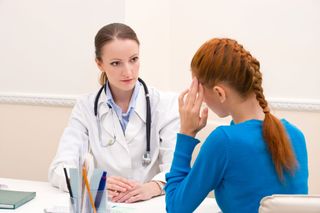More Women Need Chlamydia Screening, CDC Says

Too few young, sexually active women in the United States are getting screened for chlamydia, according to a new study by researchers at the Centers for Disease Control and Prevention.
The results show 38 percent of sexually active women ages 15 to 25 said they had been screened for chlamydia within the previous year. The CDC recommends annual screening for all sexually active women ages 25 and under.
"This new research makes it clear that we are missing too many opportunities to protect young women from health consequences that can last a lifetime," said study researcher Dr. Kevin Fenton, director of the CDC’s National Center for HIV/AIDS, Viral Hepatitis, STD and TB Prevention. "Annual chlamydia screening can protect young women’s reproductive health now and safeguard it for the future," Fenton said.
Chlamydia is the most commonly reported bacterial sexually transmitted disease in the United States, and young people are most affected. Because people often do not have symptoms, infections go undetected and untreated. Untreated chlamydia can have severe long-term health consequences, particularly for young women, including chronic pelvic pain and infertility, the CDC says.
In the study, CDC researchers analyzed data on chlamydia testing among teenage girls and young women in the United States from 2006 to 2008.
Overall testing rates remain low, although testing was most common among African-American women, those who had multiple sex partners, and those who received public insurance or were uninsured. This is encouraging because these are some of the groups at highest risk for chlamydia, the researchers said.
The CDC recommends that anyone diagnosed with chlamydia be retested three months after treatment, to ensure that those who have become re-infected can be promptly treated with antibiotics.
Sign up for the Live Science daily newsletter now
Get the world’s most fascinating discoveries delivered straight to your inbox.
However, another new study found that retesting rates remain low — just 11 percent of men and 21 percent of women in the study were retested within 30 to 180 days of initially testing positive.
Both studies were presented at this week at the National STD Prevention Conference in Minneapolis.
Pass it on: Sexually active woman ages 15 to 25 should receive annual screening for chlamydia, the CDC says.
Follow MyHealthNewsDaily on Twitter@MyHealth_MHND. Find us on Facebook.

